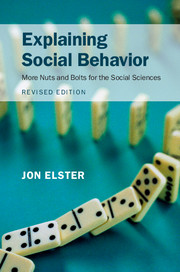4 - Motivations
from II - The Mind
Published online by Cambridge University Press: 05 August 2015
Summary
This chapter and the two following ones will be devoted to varieties of motivation. In the present chapter, the discussion is fairly general. In the following, I focus on two specific issues, selfishness versus altruism and temporal shortsightedness versus farsightedness. These two issues complement each other to some extent, the latter being as it were the intrapersonal and intertemporal version of the former, interpersonal contrast. More importantly, they are also substantially related, in the sense that farsightedness can mimic altruism.
The set of human motivations is a pie that can be sliced any number of ways. Although none of them can claim canonical status, there are four approaches that I have found useful. The first proposes a continuum of motivations, the second and the third both offer a trichotomy, and the fourth a simple dichotomy. The classifications are both somewhat similar and interestingly different, allowing us to illuminate the same behavior from different angles. Following the discussion of these typologies, I offer some further comments on motivations.
From visceral to rational
On September 11, 2001, some people jumped to their death from the World Trade Center because of the overwhelming heat. “This should not be really thought of as a choice,” said Louis Garcia, New York City's chief fire marshal. “If you put people at a window and introduce that kind of heat, there's a good chance most people would feel compelled to jump.” There was no real alternative. Subjectively, this may also be the experience of those who drink seawater when freshwater is unavailable. They may know that drinking even a little seawater starts you down a dangerous road: the more you drink, the thirstier you get. Yet the temptation may, for some, seem irresistible. The craving for addictive substances may also be experienced in this way. An eighteenth-century writer, Benjamin Rush, offered a dramatic illustration: “When strongly urged, by one of his friends, to leave off drinking [a habitual drunkard] said, ‘Were a keg of rum in one corner of a room, and were a cannon constantly discharging balls between me and it, I could not refrain from passing before that cannon, in order to get at the rum.’” Sexual desire may also be so overwhelming as to silence more prudential concerns.
- Type
- Chapter
- Information
- Explaining Social BehaviorMore Nuts and Bolts for the Social Sciences, pp. 65 - 83Publisher: Cambridge University PressPrint publication year: 2015



